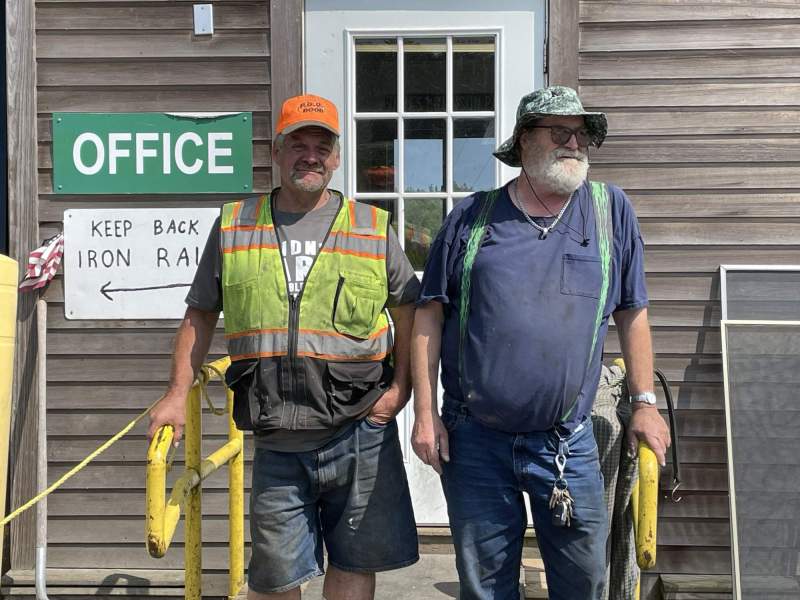 Stonington Transfer Station attendant Mike Thompson and manager Tom Brophy. Photo by Linda Nelson
Stonington Transfer Station attendant Mike Thompson and manager Tom Brophy. Photo by Linda Nelson
Ask First, Dump Second: Stonington's Transfer Station Manager has 31 Years on the Job
From the Town of Stonington Blog
Aug 9th, 2023
Posted by: Linda Nelson, Economic & Community Development Director
ASK FIRST, DUMP SECOND -- That's what Stonington's Transfer Station Manager Tom Brophy, who has developed great amounts of wisdom at his post for 31 years, will tell you is the single most important thing to know when coming to the transfer station.
"Put things where they belong," Brophy says. "And if you have a question, please ask."
Asking is important because getting rid of the 18 tons of waste PER DAY -- adding up to somewhere between 115 and 120 tons per year -- that Stonington residents and visitors create is nowhere near as simple as dumping it all into the compactor.
"Adding the second compactor was the greatest thing the Town has ever done, it has saved a lot," Brophy said when asked about some of the changes he has scene. "I really think they should put in a platform scale next. This is getting very, very expensive."
The costs and impacts of waste management for Stonington only escalated when PERC, the waste-to-energy facility in Orrington with whom the Town was contracted, shut down on May 2 in preparation for a bankruptcy auction. There are still no buyers.
"Everything is now going to the [state-owned] landfill at Juniper Ridge [in Old Town] -- and that closes in two years."
The amount of waste and costs for disposing of it have escalated hugely in Brophy's 31 years.
"It's important to recycle as much as we can. We have the 'Mercury Building' for old TV's and other electronics, and lithium batteries have to be specially handled or they start fires [regular batteries cannot be recycled at all]. We used to get $600 per ton for rigid plastic: today we only get $30 per ton for the same material so we don't take it anymore. Plastic goes into the landfill here and in most places."
Brophy cautioned that there is no such thing as "single stream" recycling in most of Maine as there is really only one facility with the equipment to do the sorting. Even so, Maine has one of the nation's highest recycling rates. He pointed toward Stonington's recycling area, where residents are asked to put each type of material into a separate bin: cardboard and mixed paper, metals, non-returnable glass for Stonington's glass crusher, and, perhaps most importantly, returnable bottles for the Transfer Station's Bottle Fund.
The Bottle Fund, founded by Brophy, Calvin Cousins, and Dave Duncan in 1996, has taken in $145,615 in its almost 30 years -- the majority of which has been distributed to 53 local students as scholarships. The fund can now award two, $2,000 scholarships annually. It is its own 501c3 to which people can donate cash as well as bottles.
"People still throw their returnables in with the regular glass recycling in spite of the signs," Brophy says. "We try to get them to pay attention to the difference -- because it makes a difference."
Comments for this Post
(comments = 0)
Leave a comment
![Town of Stonington Maine [logo]](/_img/ele/lgo-205x149.png)